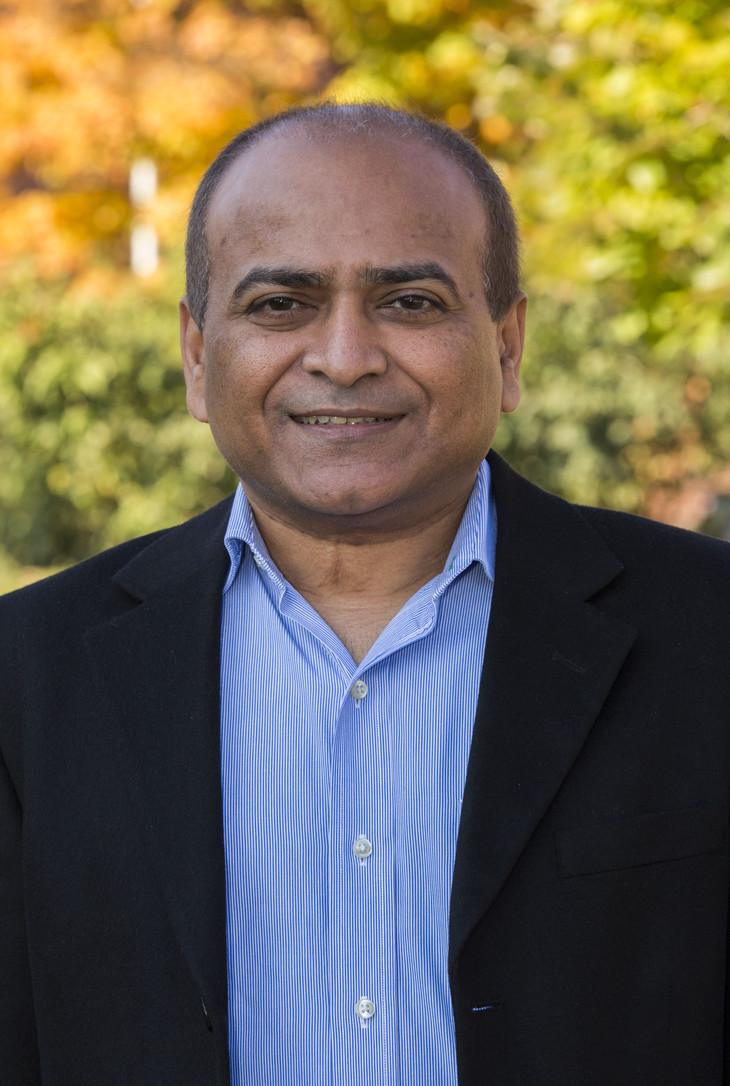
Vasant Honavar has been named the Dorothy Foehr Huck and J. Lloyd Huck Chair in Biomedical Data Sciences and Artificial Intelligence.
Vasant Honavar named Huck Chair in Biomedical Data Sciences and AI
Posted on October 27, 2021UNIVERSITY PARK, Pa. — Vasant Honavar, professor in the College of Information Sciences and Technology, has been named the Dorothy Foehr Huck and J. Lloyd Huck Chair in Biomedical Data Sciences and Artificial Intelligence by the University’s Huck Institutes of the Life Sciences.
“I’m delighted we can recognize Vasant,” said Andrew Read, director of the Huck Institutes. “His work applying data science and AI to the life sciences, especially biomedicine, has been outstanding, and I look forward to seeing where his interdisciplinarity takes him next.”
Honavar is known for his work in machine learning, knowledge representation, and bioinformatics. His current research in artificial intelligence focuses on scalable machine learning algorithms for building predictive models from federated, large, multi-modal, richly structured, longitudinal data; algorithms for eliciting causal effects from disparate sources of observational and experimental data; and the design of accountable, explainable, ethical AI systems.
His work in bioinformatics has led to state-of-the-art methods for predicting protein-protein, protein-DNA, and protein RNA interfaces and complexes and B-cell and T-cell epitopes. His work in biomedical data sciences focuses on predictive modeling from multi-omics data, predictive and causal modeling of individual and population health risks and health outcomes from behavioral, biomedical, clinical, environmental, socio-demographic data, as well as machine learning approaches to predictive modeling from brain network data. He is also interested in data and computational infrastructure for AI-enabled collaborative discovery.
“I am already engaged in a number of very exciting collaborations with colleagues at Penn State and beyond on research at the interface of artificial intelligence and biomedical data sciences. The Huck Chair affords me an opportunity to further expand such collaborations to realize the promise and potential of AI in life sciences in general, and biomedical and health sciences in particular,” said Honavar. “I am excited to pursue methodological advances in AI, especially in predictive and causal modeling from multimodal, longitudinal, health data. I look forward to working with collaborators to leverage the resulting advances to elucidate the factors that impact health risks, and especially, health disparities.”
Honavar has received more than $80 million in grants and his work has been published in over 300 peer-reviewed publications, contributing to foundational advances in AI, computer science, data sciences and biomedical informatics. He has mentored 38 doctoral students and 32 master’s students. Honavar has co-led several multi-institutional partnerships, including the Northeast Big Data Innovation Hub and the Eastern regional network focused on fostering collaborative research in computational and data sciences across disciplinary and institutional boundaries. He is also deeply engaged in developing innovative interdisciplinary graduate and undergraduate training programs in these areas.
“Vasant has developed numerous collaborations across and beyond Penn State, building a robust and productive research program that has resulted in significant contributions to multiple fields,” said Andrew Sears, dean of the College of Information Sciences and Technology. “We are pleased that his interdisciplinary approach and his application of data science and AI in the context of biomedical research is being recognized by the Huck Institutes through this appointment.”
At Penn State, Honavar is the founding director of the Center for Artificial Intelligence Foundations and Scientific Applications, the director of the Artificial Intelligence Research Laboratory, and associate director of the Institute of Computational and Data Sciences and the informatics co-lead of the Penn State Clinical and Translational Sciences Institute. In addition to the Huck Institutes of the Life Sciences, Honavar is affiliated with the Penn State Institutes for Energy and the Environment and the Social Science Research Institute. He currently serves on the faculties of Penn State’s graduate programs in informatics, computer science and engineering, bioinformatics and genomics, neuroscience, social data analytics and operations research, as well as the undergraduate data sciences program. He most recently held the Edward Frymoyer Chair of Information Sciences and Technology.
Honavar earned master’s and doctoral degrees from the University of Wisconsin-Madison in 1989 and 1990 respectively. He also received a master’s degree in electrical engineering from Drexel University in 1984, and a bachelor’s degree in electronics engineering from Bangalore University in 1982. Prior to joining Penn State, he served on the faculty of Iowa State University from 1990 to 2013.
The Huck Institutes of the Life Sciences support interdisciplinary and transdisciplinary research by offering interdisciplinary graduate programs, operating shared core facilities, supporting strategic research initiatives through faculty co-hires and cluster hires, and operating the institutes’ Centers of Excellence.

